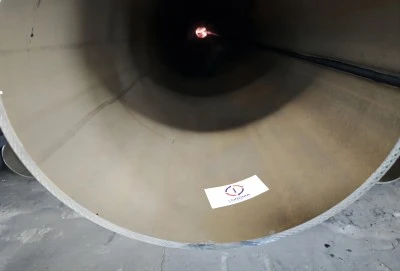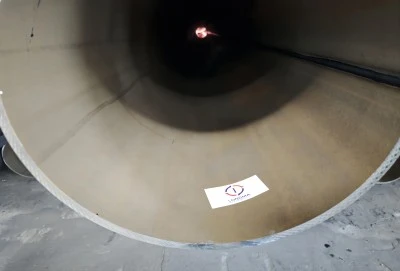When it comes to erw pipe weight, a standard 80mm diameter pipe typically weighs around 14.5 to 15.5 kg per meter, depending on the wall thickness. For a standard 6-meter length, an 80mm pipe would weigh approximately 87 to 93 kg. However, it's crucial to note that these figures can vary based on factors such as steel grade, manufacturing specifications, and industry standards.
|
|
|
Calculating ERW 80mm Pipe Weight
Understanding ERW pipe specifications and dimensions
Electric Resistance Welded (ERW) pipes are widely used in various industries, including oil and gas transportation, water supply systems, and structural applications. To accurately determine the weight of an 80mm pipe, it's essential to understand its specifications and dimensions.
ERW pipes are manufactured by rolling flat steel sheets into a cylindrical shape and welding the seam using electric resistance. The 80mm designation refers to the nominal diameter, which is the pipe's outer diameter. However, the actual outer diameter may vary slightly due to manufacturing tolerances.
Wall thickness is another crucial dimension that significantly impacts the pipe's weight. For 80mm pipes, common wall thicknesses range from 3.2mm to 6.4mm, depending on the intended application and pressure requirements.
Step-by-step weight calculation for 80mm ERW pipes
To calculate the weight of an 80mm ERW pipe, follow these steps:
- Determine the pipe's outer diameter (OD) and wall thickness (WT).
- Calculate the inner diameter (ID) by subtracting twice the wall thickness from the outer diameter.
- Compute the cross-sectional area of steel using the formula: Area = π(OD² - ID²) / 4
- Multiply the cross-sectional area by the density of steel (approximately 7.85 g/cm³).
- Convert the result to kilograms per meter.
For example, an 80mm erw pipe with a 4mm wall thickness would have:
- OD = 80mm
- ID = 80mm - (2 * 4mm) = 72mm
- Area = π(80² - 72²) / 4 = 956.8 mm²
- Weight per meter = 956.8 mm² * 7.85 g/cm³ * 0.1 = 7.51 kg/m
Using weight charts and online calculators for accuracy
While manual calculations provide a good estimate, using weight charts or online calculators can offer more precise results. Many pipe manufacturers and engineering resources provide these tools, which take into account industry standards and specific material properties.
When using online calculators, input the pipe's nominal size, wall thickness, and material grade for accurate weight estimations. These tools often include options for different pipe standards, such as ASTM A53 or API 5L, ensuring compliance with specific industry requirements.
Factors Affecting ERW Pipe Weight
Impact of wall thickness on 80mm ERW pipe weightWall thickness plays a significant role in determining the weight of an 80mm ERW pipe. As the wall thickness increases, so does the pipe's weight per unit length. For instance, an 80mm pipe with a 3.2mm wall thickness will weigh considerably less than one with a 6.4mm wall thickness.
The choice of wall thickness depends on various factors, including:
- Operating pressure requirements
- Structural load-bearing capacity
- Corrosion allowance
- Safety factors and industry standards
Engineers and project managers must carefully consider these factors when selecting the appropriate wall thickness for their applications, as it directly impacts both the pipe's performance and its weight.
Steel grade and density influence on pipe mass
The steel grade used in manufacturing ERW pipes affects their weight due to variations in material density and composition. Common steel grades for pipes include:
- API 5L Grade B
- API 5L X42, X52, X60, and higher grades
- ASTM A53 Grade B
Higher-grade steels often have slightly different densities, which can result in minor weight variations. Additionally, the manufacturing process and heat treatment can influence the final density of the pipe material.
Length variations and their effect on total pipe weight
While pipe weight is typically expressed in kilograms per meter, the total weight of a pipe section depends on its length. Standard erw pipe lengths often range from 6 to 12 meters, but custom lengths are available for specific project requirements.
When calculating total pipe weight for transportation or installation purposes, it's crucial to consider:
- Standard vs. custom lengths
- Cutting allowances and tolerances
- Joint types and additional fittings
Accurate weight calculations based on actual pipe lengths are essential for logistics planning, crane capacity determination, and structural load assessments in construction projects.
Weight Variations in 80mm ERW Pipes
Standard vs. custom 80mm ERW pipe weight differencesStandard 80mm pipes are manufactured according to established industry norms, resulting in consistent weight across different manufacturers. However, custom ERW pipes may deviate from these standards to meet specific project requirements.
Custom 80mm pipes might feature:
- Non-standard wall thicknesses
- Special coatings or linings
- Modified end preparations
These customizations can lead to weight variations compared to standard pipes. Project engineers should account for these differences when specifying custom ERW pipes for their applications.
Industry-specific weight requirements for ERW pipes
Different industries have varying requirements for ERW pipe weights based on their specific applications:
- Oil and gas: Emphasis on pressure ratings and corrosion resistance
- Water supply: Focus on flow capacity and long-term durability
- Structural applications: Prioritize load-bearing capacity and weldability
These industry-specific requirements can lead to variations in pipe weights even within the same nominal size. Engineers must consider these factors when selecting pipes for their projects to ensure optimal performance and compliance with industry standards.
Comparing 80mm ERW pipe weights across manufacturers
While industry standards provide guidelines for ERW pipe specifications, slight variations in weight can occur across different manufacturers due to:
- Manufacturing process tolerances
- Material sourcing and composition
- Quality control practices
When comparing 80mm pipe weights from various suppliers, it's essential to consider:
- Adherence to relevant standards (e.g., API 5L, ASTM A53)
- Manufacturing certifications and quality assurance
- Actual measured weights vs. theoretical calculations
Procurement managers should request detailed weight specifications and tolerances from potential suppliers to ensure consistency and accuracy in their pipe weight estimations.
Understanding the weight of 80mm ERW pipes is crucial for various aspects of project planning and execution in industries such as oil and gas, water supply, and structural engineering. While standard calculations provide a good starting point, factors like wall thickness, steel grade, and manufacturing variations can influence the actual pipe weight.
ERW Pipe For Sale
Hebei Longma Group offers high-quality pipes for your project needs. Our state-of-the-art production equipment, imported from Germany and enhanced with our own innovations, ensures top-notch pipe manufacturing. With a team of over 300 skilled employees, including 60+ technical experts, we guarantee precision and expertise in every pipe we produce. Our comprehensive testing facilities, featuring ultrasonic flaw detectors and industrial X-ray equipment, maintain strict quality control. We pride ourselves on fast delivery, with standard thickness pipes ready in as little as 7 days. Our products come with complete certifications, including API 5L and ISO 9001. Thanks to our efficient production model and strong supplier relationships, we offer competitive pricing without compromising on quality. To learn more about our erw pipe offerings or to place an order, contact us at info@longma-group.com.














